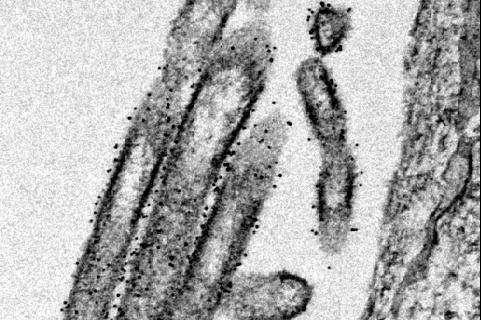Researchers at Emory University in Atlanta have developed a trial vaccine against RSV. The vaccine, OE4, is an engineered form of RSV and labeled with an antibody against the F viral protein as seen in the above pictures of human lung cells. Stobart Et Al Nature Communications
ATLANTA, Dec. 21 (UPI) -- Researchers have successfully engineered the respiratory syncytial virus, or RSV, to weaken without losing its immunogenicity in laboratory tests.
The team at Emory University School of Medicine and Children's Healthcare of Atlanta has been able to protect mice and cotton rats from RSV infection by using the trial vaccine.
The results were published in the Dec. 21 edition of Nature Communications.
"Our paper shows that it's possible to attenuate RSV without losing any immunogenicity," Martin Moore, Ph.D., senior author of the study and associate professor of pediatrics at Emory University School of Medicine and a Children's Healthcare of Atlanta research scholar, said in a press release.
"This is a promising live-attenuated vaccine candidate that merits further investigation clinically."
RSV primarily impacts very young children and is the number one cause of pneumonia deaths in children worldwide and a leading cause of infant hospitalization in the United States.
Scientists have been unsuccessful at creating a vaccine against RSV because in a weakened state, RSV does not stimulate an immune-system response like other vaccines.
Vaccines are typically created by using a weakened strain of a virus such as polio or measles to create a strain that is safe but also stimulates the immune system to destroy the virus.
Initial attempts at an RSV vaccine in the 1960s failed because when RSV was chemically inactivated, like in a flu shot, the virus actually made the natural RSV stronger and caused worse infections in infants.
"Achieving that balance is a challenge," Moore said. "Weakening RSV by passage hasn't worked out satisfactorily. It turns out that for RSV, the natural virus does not induce a lot of immunity itself."
So Moore and his colleagues engineered RSV to enhance the production of a key protein called F, for fusion. The F protein allows RSV to enter cells and makes the virus more stable while also removing or weakening other viral genes that promote infection and suppress the immune system.
This modified virus is called OE4, and stimulates high levels of antibody production. The team rewrote several of the viral genes in the OE4 strain using codon-deoptimization to make it less likely for a re-engineered virus to mutate back to its original state.
In laboratory trials, OE4 vaccine completely protected mice and cotton rats against later infection by regular forms of RSV.
The next step for the vaccine is to produce a clinical grade lot and conduct a phase 1 study of safety and immunogenicity in infants, Moore said.















